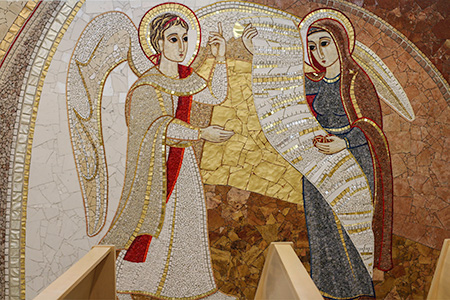 Mary of Nazareth, whom we cherish as our sister and mother, by her life and example, bids us open our hearts to God, in the midst of the complexities and contradictions which surround us. She was greeted at the Annunciation as the one who is full of grace (Lk 1:28). This expresses God’s plan for her as well as her own purity of heart and her deep sense of God as the Absolute in her life.
Mary of Nazareth, whom we cherish as our sister and mother, by her life and example, bids us open our hearts to God, in the midst of the complexities and contradictions which surround us. She was greeted at the Annunciation as the one who is full of grace (Lk 1:28). This expresses God’s plan for her as well as her own purity of heart and her deep sense of God as the Absolute in her life.
But yet this greeting takes her by surprise and so she hesitates: how can this be possible…? When the angel reveals God’s mysterious plan to her, she gives her total consent in a way which recalls the attitude of Elijah, “Behold the handmaid of the Lord. Let what you have said be done to me” (Lk 1:38; cf. 1 Kg 17:1; 18:36). At this point a new life begins for her, the adventure of total faith which will lead her to risk her entire existence as she witnesses her own plans for her life being totally upset.
Her consent brought her a life filled with joy and sorrow. She resolved the difficult moments of her life by being open to the power of the Word (cf. Lk 2:19.51). In prayer she pondered on the plan of God which she accepted with serenity. In so doing her love grew more tender and compassionate.
The Gospels give us an image of Mary with her heart and her hands always open to the needs of others. After the Annunciation she set out for a Judean town, to be with her relative Elizabeth. It was love that brought her there. From her heart the song of the Magnificat erupted as an expression of solidarity with the poor of Yahweh.
We meet her again in Bethlehem and in Jerusalem as the loving and attentive mother. In Cana she showed her attention to the needs of the young couple; along the roads of Palestine she is the disciple of the Word; on Calvary, suffering pierces her heart; in the Upper Room, standing in the midst of the apostles, she was a source of comfort and hope, ready to follow the way of the newly born Church, a disciple among disciples.
The faith, the tenderness, the obedience and the loving service of Mary are at the heart of the Carmelite charism. In every age Carmelites have pondered on these virtues and tried to express them in their own time and culture.
Source: General Chapter 1995, Carmel: a Place and a Journey into the Third Millenium.
